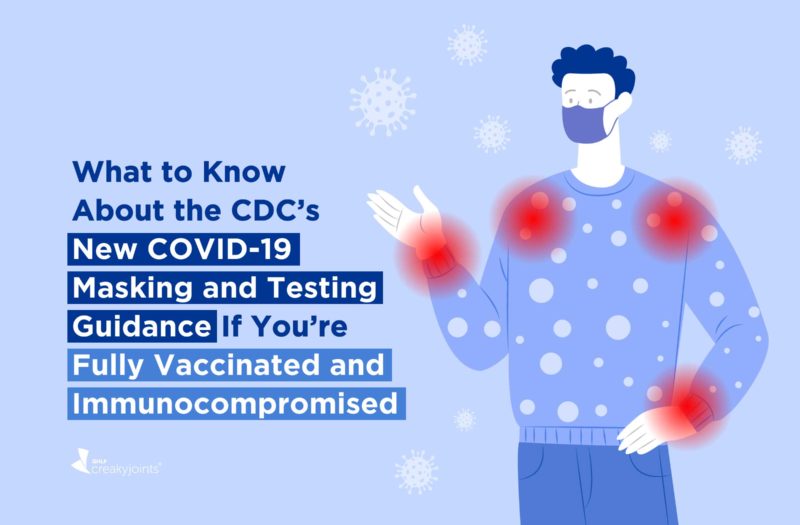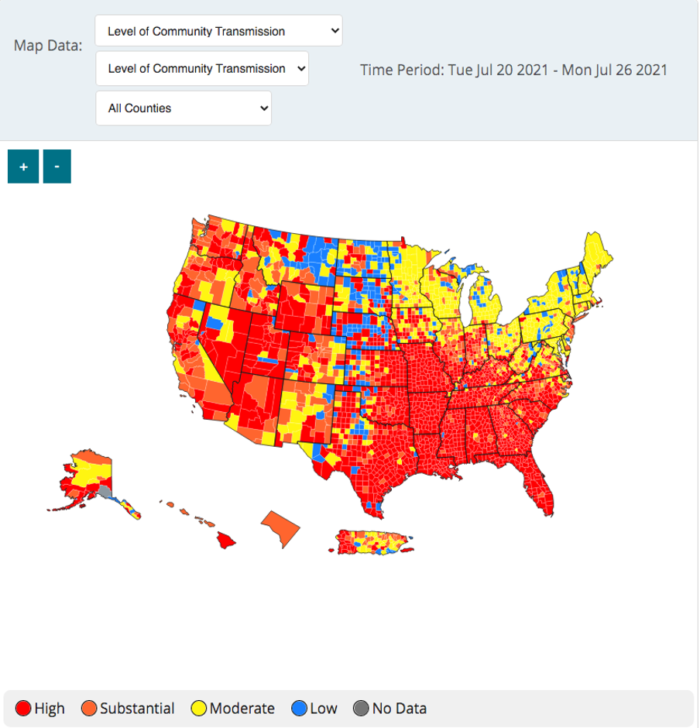Learn more about our FREE COVID-19 Patient Support Program for chronic illness patients and their loved ones.
This week, the U.S. Centers for Disease Control and Prevention (CDC) updated its public health recommendations for all fully vaccinated people as the Delta variant of the coronavirus spreads quickly throughout the United States and the world.
If you’re immunocompromised, you’ve likely stayed more vigilant than the average person about wearing a mask and otherwise protecting yourself from COVID-19, especially given the recent research that shows autoimmune patients have a slightly lower response to the COVID-19 vaccine than others. (However, this is largely dependent on which specific immunosuppressant medications you take.)
But if you’ve gotten even a little more lax about following COVID-19 restrictions to the letter, now is the time to start becoming cautious again.
The new recommendations alter how fully vaccinated people go about their everyday lives, depending on where they live. Here are the key changes in the CDC’s recommendations:
- Fully vaccinated people should wear a mask in public, indoor settings in areas of substantial or high transmission.
- Fully vaccinated people might choose to wear a mask regardless of the level of transmission in their area, particularly if they are immunocompromised or at increased risk for severe disease from COVID-19 — or if someone in their household is immunocompromised, at increased risk, or not fully vaccinated.
- Fully vaccinated people who have a known exposure to someone with suspected or confirmed COVID-19 should be tested three to five days after exposure and wear a mask in public indoor settings for 14 days or until they receive a negative test result.
- All teachers, staff, students, and visitors to schools, should wear masks indoors, regardless of vaccination status.
This is a big shift from the CDC guidance issued in May that stated fully vaccinated people didn’t need to wear masks outdoors or indoors. But that was before the Delta variant gained traction in the United States amid lagging vaccination rates. This variant is believed to be more than twice as transmissible as earlier virus variants, reports the Washington Post.
Many CreakyJoints and Global Healthy Living Foundation members who are immunocompromised and fully vaccinated — and who never stopped wearing masks indoors and practicing other COVID-19 mitigation efforts, like avoiding crowded places and large gatherings — have mixed feelings about the new guidance.
On one hand, there is relief that the restrictions may help stop the rising spread of COVID-19, but on the other, there’s a very frustrated sense of “too little, too late” — that the CDC shouldn’t have loosed their guidelines so dramatically earlier this year. There’s also a lot of concern that the mask recommendations won’t be followed, vaccination rates will continue to lag, and those who are immunocompromised will continue to be at increased risk for COVID-19 and marginalized as the rest of the country and world moves on.
Being Cautious If You’re Immunocompromised
The guidance includes updated information specifically for people who are immunocompromised. According to the CDC, “people who are immunocompromised should be counseled about the potential for reduced immune responses to COVID-19 vaccines and to follow current prevention measures (including wearing a mask, staying six feet apart from others they don’t live with, and avoiding crowds and poorly ventilated indoor spaces) regardless of their vaccination status to protect themselves against COVID-19 until advised otherwise by their health care provider.”
The CDC says the decision to adjust its guidance was not taken lightly. “On rare occasions, some vaccinated people infected with the Delta variant after vaccination may be contagious and spread the virus to others,” CDC Director Rochelle Walensky, MD, said in a news briefing, per NPR. “This new science is worrisome and, unfortunately, warrants an update to our recommendations.”
Based on this guidance, it’s a good idea to start being more careful again when it comes to wearing a mask indoors — especially if you’re immunocompromised.
You may also want to be stricter about insisting those around you wear masks indoors in public places, avoiding close contact with people indoors who are not wearing masks, or avoiding stores and locations where people are likely to be indoors and not wearing masks, particularly if they’re crowded and you can’t easily social distance.
What ‘High or Substantial Transmission’ Means
Stay updated on COVID-19 transmission in your area, as your town, county, and state’s status may affect your decisions. You can check the transmission in your area by using this CDC tool. You may be surprised that the transmission in your area is higher than you might realize, as Delta is spreading quickly and causing a rapid uptick in cases.
The map below shows the COVID-19 transmission rates in the United States between July 20 to July 26 of 2021. As you can see, most of the U.S. has high (red) or substantial (orange) levels of community transmission.
Nationwide, confirmed COVID-19 infections have quadrupled in July, growing from about 13,000 cases per day on average at the beginning of the month to more than 56,000 cases by the end of the month, per the Washington Post.
Testing for COVID-19 If You’re Fully Vaccinated
Another important part of the updated recommendations is that you should now get tested for COVID-19 if you’ve had a known exposure to it, even if you don’t have symptoms. The CDC says that fully vaccinated people should be tested three to five days after a known exposure to someone with suspected or confirmed COVID-19 and wear a mask in public indoor settings for 14 days or until they receive a negative test result.
Also, fully vaccinated people who live with someone who is immunosuppressed, at increased risk of severe disease, or unvaccinated (such as children under age 12) may consider masking up at home for 14 days after a known exposure or until they receive a negative test result.
“Most fully vaccinated people with no COVID-like symptoms do not need to quarantine or be restricted from work following an exposure to someone with suspected or confirmed COVID-19, if they follow the testing and masking recommendation above,” per the recommendations.
The updated guidance comes as New York and California require vaccinations or weekly tests for public workers, per AP News. Meanwhile, St. Louis and Los Angeles have re-imposed mandates on wearing face masks indoors.
For more ways to stay safe, bookmark these coronavirus tips and advice for people living with chronic illness.
Get Free Coronavirus Support for Chronic Illness Patients
Join the Global Healthy Living Foundation’s free COVID-19 Support Program for chronic illness patients and their families. We will be providing updated information, community support, and other resources tailored specifically to your health and safety.
.
Abutaleb Y, et al. CDC urges vaccinated people in covid hot spots to resume wearing masks indoors. The Washington Post. July 28, 2021. https://www.washingtonpost.com/health/2021/07/27/cdc-masks-guidance-indoors/.
COVID-19 Integrated County View. COVID Data Tracker. U.S. Centers for Disease Control and Prevention. Accessed July 29, 2021. https://covid.cdc.gov/covid-data-tracker/#county-view.
How to Protect Yourself & Others. COVID-19. U.S. Centers for Disease Control and Prevention. July 26, 2021. https://www.cdc.gov/coronavirus/2019-ncov/prevent-getting-sick/prevention.html.
Interim Public Health Recommendations for Fully Vaccinated People. COVID-19. U.S. Centers for Disease Control and Prevention. July 28, 2021. https://www.cdc.gov/coronavirus/2019-ncov/vaccines/fully-vaccinated-guidance.html.
Marcello P. California, NYC to workers: Get vaccine or face weekly tests. AP News. July 26, 2021. https://apnews.com/article/joe-biden-health-coronavirus-pandemic-0f571cd04622cfb37eaf777449f408b3.
Simmons-Duffin S. Do You Need To Wear A Mask Indoors Where You Live? Check This Map. NPR. July 28, 2021. https://www.npr.org/sections/health-shots/2021/07/28/1021795290/cdc-mask-guidelines-indoors-vaccinated-by-county-covid-spread.







